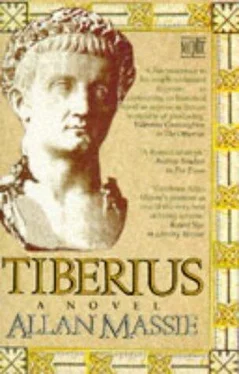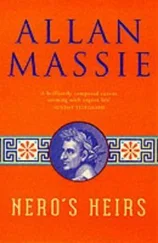Allan Massie - Tiberius
Здесь есть возможность читать онлайн «Allan Massie - Tiberius» весь текст электронной книги совершенно бесплатно (целиком полную версию без сокращений). В некоторых случаях можно слушать аудио, скачать через торрент в формате fb2 и присутствует краткое содержание. Жанр: Исторические приключения, на английском языке. Описание произведения, (предисловие) а так же отзывы посетителей доступны на портале библиотеки ЛибКат.
- Название:Tiberius
- Автор:
- Жанр:
- Год:неизвестен
- ISBN:нет данных
- Рейтинг книги:5 / 5. Голосов: 1
-
Избранное:Добавить в избранное
- Отзывы:
-
Ваша оценка:
- 100
- 1
- 2
- 3
- 4
- 5
Tiberius: краткое содержание, описание и аннотация
Предлагаем к чтению аннотацию, описание, краткое содержание или предисловие (зависит от того, что написал сам автор книги «Tiberius»). Если вы не нашли необходимую информацию о книге — напишите в комментариях, мы постараемся отыскать её.
Tiberius — читать онлайн бесплатно полную книгу (весь текст) целиком
Ниже представлен текст книги, разбитый по страницам. Система сохранения места последней прочитанной страницы, позволяет с удобством читать онлайн бесплатно книгу «Tiberius», без необходимости каждый раз заново искать на чём Вы остановились. Поставьте закладку, и сможете в любой момент перейти на страницу, на которой закончили чтение.
Интервал:
Закладка:
As against this, the coincidence is explicable if one remembers that the figure who appears to Munthe also claims to have appeared centuries previously to none other than Tiberius. It has always been assumed that Munthe invented this genius loci; but what, it occurred to me, if he had not? Might not such a supposition confirm the authenticity of the memoirs?
Then there is another story — about Sirens — which recalls one by Giuseppe di Lampedusa. That would place the concoction of the memoirs unacceptably late, I thought; besides, the Mediterranean lands are rich in Siren stories, and it is known that Tiberius took a particular interest in the myth. And then there is the postscript, which is decidedly rum, though it purports to account for the survival of the original memoirs in manuscript.
Ultimately I remain undecided. I do not assert that these are the memoirs of Tiberius, or not unequivocally so. I think the bare bones of the narrative may be authentic, but that subsequent versions have refined, expanded and glossed them.
And I find myself asking whether it matters. What we have here, persuasively and movingly in my opinion — else I should not have put myself to the labour of translating the work — is a remarkable portrait of one of the greatest, and certainly the unhappiest, of Roman emperors. In the end, I say to myself, fiction — if this is fiction — may offer truths to which neither biography nor even autobiography can aspire. Who knows himself or another man as thoroughly as the artist may imagine a life? Whose identity is fixed? A great and malignant artist, Tacitus, pinned a terrible portrait of Tiberius on the wall of history. If another hand has been moved to amend that picture, so be it. It was Napoleon, with his uncanny penetration of men's motives, who dismissed the great historian as le poete; yet Tacitus' lying truth held sway for centuries. The author of this autobiography, whoever he may be, is, I would claim, a poet himself at moments, and I trust that his version of the story, a version which is certainly the case for the defence, will work its influence also. Tiberius has waited long for justice; perhaps it is time that the deceptive bargain offered him by the divine boy in the garden, who promised the aged emperor peace of mind in exchange for the sacrifice of his reputation, should be expunged.
So I do not care whether these memoirs are authentic or not. They convince me that they contain important verities. Basta!
I had written this and left it to rest a week or two, to see if there was anything I wished to add.
No sooner had I concluded that I was satisfied, than I received a telephone call.
I recognised the voice at once. It was the Count. He reminded me of a bargain we had not made: that he should receive seventy-five per cent of translation rights, and twenty per cent of my English royalties. When I told him I had no memory of this, and had anyway thought him dead, he laughed.
"I have given Tiberius to drink of my elixir," he said. "Why should you suppose that either he or I can die?"
I had no answer to that. He promises to appear at the publication party. We shall see.
Book One
Chapter One
That I relish dryness is not strange: I have campaigned too many years in the rains of the Rhine and Danube valleys. I have marched miles, ankle-deep, through mud, and slept in tents soaked through by morning. Yet my relish for what is dry is of another nature: I detest sentiment or displays of feeling; I detest acting. I detest self-indulgence, and that emotion in which one eye does not weep but observes the effect of tears on those who watch. I take pleasure in language which is precise, hard and cruel. This has made me a difficult and uncomfortable person. My presence makes my stepfather, the Princeps, uneasy. I have known this since I was a youth. For years I regretted it, for I sought his approval, even perhaps his love. Then I realised I could never have either of these: he responded to the false spontaneous charm of Marcellus, as he does now to that of his grandsons, Gaius and Lucius, who are also my stepsons.
Nothing has been easy for me, and it would not be surprising if I were to relapse into self-pity. It is a temptation, because my merits have ever been unjustly disregarded on account of my lack of charm. I have never been able to dispel clouds with a smile and a jest, and it is natural if I have experienced twinges of envy when I see my inferiors able to do so. Yet I am kept from self-pity by my pride. This is inherited. It is Claudian pride.
Augustus has always been rendered uneasy on account of the indignity of his birth. It is only by the accident of marriage that he has had a career; the accident of two marriages, I should say, for there can be no question that his own marriage to my mother smoothed his path to power.
It was, however, the marriage of his grandfather, M. Atius Balbus, to Julia, the sister of Gaius Julius Caesar, the future dictator, which raised his family from an obscure provincial station. The Princeps' own father was the first member of the family to enter the Senate. Contrast that with my heredity.
I shall not boast of the Claudian gens: our achievements glitter on every page of the Republic's history.
Mark Antony — a liar of course — used to delight in mocking my stepfather's antecedents. He would claim that the great — grandfather of his colleague in the triumvirate had been a freed-man and rope-maker, and his grandfather a dishonest money-changer. It is not necessary to believe such charges to understand why Augustus' attitude to the old aristocracy of Rome has been ambiguous: he is both resentful and dazzled.
I, being a Claudian, judge these things better. I know the worthlessness of my fellow nobles. I recognise that their decadence has made them unfit to govern, and so destroyed Liberty in Rome. Though the Roman Empire now extends over the whole civilised world to the limits of the Parthian Empire in the East, our great days are behind us; we have been compelled to acquiesce in the suppression of Liberty.
I write this in retreat in Rhodes, in the tranquillity of my villa overlooking the sea. My life is now devoted to the study of philosophy and mathematics, and to pondering the nature of experience. Accordingly it is not surprising that I should think to write my autobiography. There is good precedent for this, and any man of enquiring intelligence must frequently stand amazed before the spectacle of his own life and wish to make sense of it.
I am forty-two years old. My public life is ended through circumstances and my own desire. I have been humiliated in my private life. I am disgraced through no fault of my own, rather on account of the schemes of others and my own indifference. I may, if the Gods will it, have as long to live again, though nightly I pray otherwise. Even from this distance I cannot contemplate the shipwreck of old age with equanimity.
My father was Tiberius Claudius Nero, dead now for more than thirty years. (I was nine when he died. They made me deliver his funeral oration. More of that later, if I can bring myself to write it.) My mother, who still lives, is Livia Drusilla. She was seduced by the triumvir, Caesar Octavianus, who is now styled Augustus. He was not deterred by the fact that she was pregnant. My brother, Drusus, was born three days after their marriage. He knew no father but Augustus, and our real father refused to receive him: he liked to pretend that Drusus was not his son. This was nonsense. Perhaps it salved his pride.
I used to go to stay with him on the estate in the Sabine Hills to which he had retired. I wish I could claim vivid memories. But I have few, except of meals. He comforted himself with gluttony; his dinner lasted the whole afternoon. He liked me, even when I was only six or seven, to drink wine with him.
Читать дальшеИнтервал:
Закладка:
Похожие книги на «Tiberius»
Представляем Вашему вниманию похожие книги на «Tiberius» списком для выбора. Мы отобрали схожую по названию и смыслу литературу в надежде предоставить читателям больше вариантов отыскать новые, интересные, ещё непрочитанные произведения.
Обсуждение, отзывы о книге «Tiberius» и просто собственные мнения читателей. Оставьте ваши комментарии, напишите, что Вы думаете о произведении, его смысле или главных героях. Укажите что конкретно понравилось, а что нет, и почему Вы так считаете.












